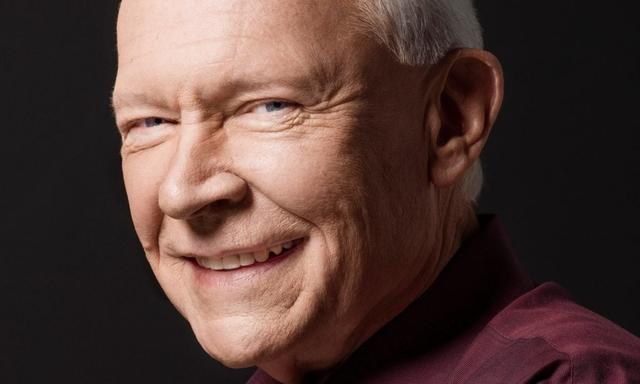If you click on a link and make a purchase we may receive a small commission. Read our editorial policy.
How Dexter and King of the Hill both used their revivals to make a commentary on the predatory practices of the gig economy
The Dexter and King of the Hill revivals both have their protagonist become victims of the gig economy

Popverse's top stories
- "And my axe!" Lord of the Rings star John Rhys Davies says there's one world leader who deserves Gimli's iconic weapon
- Wonder Man is the Andor of Marvel Studios’ modern TV series on Disney+
- Absolute Batman happened because DC Comics writer Scott Snyder got bored reading about ‘superhero fatigue’
Dexter Morgan and Hank Hill don’t have many things in common, but they’ve both found themselves victims of the gig economy.
This summer, Dexter and King of the Hill both returned with revival television shows. Dexter: Resurrection focuses on Dexter starting a new life in New York City after nearly dying in Dexter: New Blood, and King of the Hill season 14 finds Hank Hill returning to Arlen, Texas, after spending years in Saudi Arabia, only to find that his home is a much different place.
Dexter and King of the Hill couldn’t be more different shows. King of the Hill focuses on an average Texas man in slice-of-life stories, while Dexter follows the exploits of serial killer who hunts other serial killers. In other words, there’s not a lot of thematic crossovers. However, I was surprised to see both television reboots had storylines about the modern gig economy.
If you’re not familiar, the gig economy refers to people who do work like rideshare, delivery apps, or other on-demand work. In the gig economy, the worker isn’t an employee; they’re an independent contractor. As such, they don’t get a guaranteed wage, insurance, overtime pay, or the typical protections you would expect from a normal job. In most cases, such as rideshare, the user pays for many of their job expenses, such as car maintenance. The benefit is that the worker can choose when they want to work and how long they work for. I’ve written about gig economy workers for Popverse before, and full disclosure, I’ve done rideshare work to get me through tough financial times.
Hank Hill chases ratings

King of the Hill deals with the gig economy right off the bat. Minutes into the season 14 premiere, Hank and Peggy take a rideshare back from the airport to their home. Hank asks the driver to make a stop so he can use the bathroom and order food. Rideshare companies like Lyft and Uber pay pennies per minute when a vehicle isn’t in motion, so Hank and Peggy’s driver likely wasn’t being paid much for this extra stop, which was undoubtedly long.
When the driver arrives at the Hill residence, he unloads their luggage and expects a five-star rating. “I'm going to give you a four. That way, it gives you something to work towards,” Hank tells him. This is a rude thing to do when a driver made a (virtually unpaid) stop for you to pick up food and unload your luggage. However, what most people don’t realize is that any rating below a five sends a message to Uber and Lyft to fire your driver slowly.
Have you ever wondered why you’ve never seen a three-star Uber or Lyft driver? That’s because Uber and Lyft deactivate drivers when their rating falls below 4.6. Simply put, if a driver gave 100 rides in a week, and all of those passengers rated them four stars, they would lose their job. This causes drivers to chase ratings or risk losing their income.
The chase for ratings is the focus of the fourth episode of the rebooted season, ‘Chore Money, Chore Problems.’ Seeking to find meaning now that he’s retired, Hank takes a series of handyman jobs from a gig economy app called Chore Chimp. Hank hangs up a curtain rod perfectly, but the app user rates him two bananas (Chore Chimp’s rating system) instead of five. This motivates Hank to return to their home and offer to do free handyman work if they’ll change his rating.
The Chore Chimp storyline was largely about Hank learning how to open up and confront his feelings of inadequacy now that he has retired. However, whether intentional or not, the storyline also served as an interesting commentary on the gig economy. Because the ratings system controls everything, the rating eventually becomes more important than the task itself.
“My job wasn’t to give them advice. I was to hang a curtain rod. I deserved all five bananas,” Hank tells Peggy in frustration. Hank goes to desperate lengths to get the perfect rating, including opening up to his clients about some intimate and uncomfortable things. This is almost unheard of for Hank.
Hank is right, he should’ve been rated for the job he did, nothing more, nothing less. But that’s not how gig economy works. A driver can be deactivated if passengers give them low ratings because they don’t have extra water bottles or phone chargers. You’re encouraged to go above and beyond, which shouldn’t be a bad thing, but the system is abused to the disadvantage of the gig worker.
Driving with Dexter

Dexter: Resurrection opens with Dexter Morgan starting over. He had spent years living in a small town called Iron Lake under an assumed name after faking his death. His life in Iron Lake is over, and he’s been legally declared alive. Dexter heads to New York City to track his son down, and once he’s there, he needs a way to make money.
Dexter becomes a UrCar driver, which is the show’s copyright-safe version of Uber and Lyft. Rideshare work is appealing for people starting their lives over, like Dexter, because there is minimal paperwork to get started, and you can start earning money almost immediately.
It isn’t long before Dexter runs into the same problems Hank Hill had on Chore Chimp. There’s nothing wrong with his driving, but his rating plummets because his car has no amenities like phone chargers or water bottles. Dexter’s landlord Blessing, who is also a UrCar driving, warns Dexter that he’ll be deactivated if he doesn’t supply snacks, mints, and other amenities.
“Am I driving a car or a bodega,” Dexter asks. Blessing tells him to anticipate all the passenger’s needs. This is great for a concierge or an executive assistant, but it’s a lot to ask of a driver who at times makes less than minimum wage.
Don’t forget, Dexter has to pay for these amenities out of pocket. How many jobs can you think of where you have to use your own money or risk being fired? Not to the high vehicle maintenance costs.
Dexter: Resurrection also presents a side of the gig economy that King of the Hill doesn’t, the danger. There’s a serial killer in New York City targeting rideshare drivers, but most of the drivers are financially dependent on the work, so they can’t stop. There are no vacation days or sick days. If you don’t drive, you don’t get paid.
Dexter takes care of the serial killer, because that’s what he does. However, the idea of a rideshare serial killer isn’t a work of victim. According to one report, 31 rideshare drivers were murdered on the job in 2022, and that number doesn’t take into account the people who have been attacked. (Full disclosure, I’ve been physically threatened and attacked while doing rideshare.)
The unlikely King of the Hill and Dexter crossover

One thing that television revivals do is reflect on how the world has changed since the original show ended. That’s what Dexter and King of the Hill did, and it’s interesting that both shows did an episode about the gig economy, and both came away with a similar message. The fact that Dexter and Hank are two completely different types of characters makes it more interesting because both shows use similar story beats to make a commentary on gig work.
Both characters discovered that the job being done was secondary to the rating, and they needed to provide extra service or risk being deactivated. For Hank, this meant offering free work. For Dexter, this meant laying out his own money for amenities. It’s a damning but accurate commentary on the gig economy, and the predatory way it keeps its workers under its thumb.
Dexter Morgan and Hank Hill couldn’t be more different, but if they ever wind up meeting, they will have common ground on one thing.
Want to know what's coming up next in pop culture? Check out Popverse's guides to:
Follow Popverse for upcoming event coverage and news
Find out how we conduct our review by reading our review policy
Let Popverse be your tour guide through the wilderness of pop culture
Sign in and let us help you find your new favorite thing.
















Comments
Want to join the discussion? Please activate your account first.
Visit Reedpop ID if you need to resend the confirmation email.